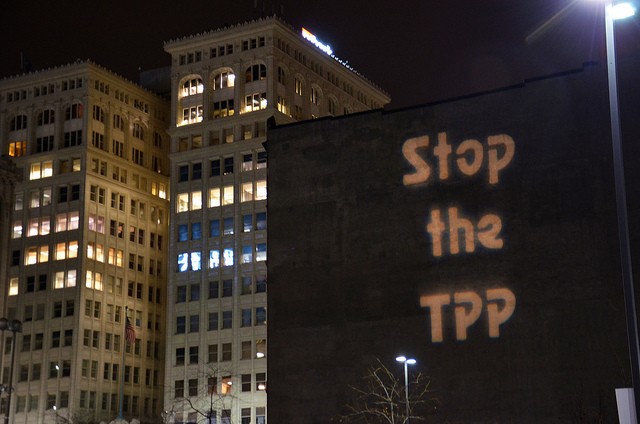Washington Post: In a dark corner of the Trans-Pacific Partnership lurks some pretty nasty copyright law
TPP's copyright provisions will diminish the value of a rich public domain and enact regulations that will dismantle our online freedoms. Speak out now at StoptheSecrecy.net Article by David Post for the Washington Post The extent to which our international obligations interact with — and may sometimes override — domestic law is a pretty fascinating one, and is, for any number of pretty obvious reasons, increasingly in the news. Here’s a rather small footnote to the very large controversy over the Trans-Pacific Partnership treaty, involving a narrow (but actually quite important) bit of U.S. copyright law, that nicely illustrates how complicated these questions can be — a synecdoche, as it were.
TPP's copyright provisions will diminish the value of a rich public domain and enact regulations that will dismantle our online freedoms. Speak out now at StoptheSecrecy.net
Article by David Post for the Washington Post
The extent to which our international obligations interact with — and may sometimes override — domestic law is a pretty fascinating one, and is, for any number of pretty obvious reasons, increasingly in the news. Here’s a rather small footnote to the very large controversy over the Trans-Pacific Partnership treaty, involving a narrow (but actually quite important) bit of U.S. copyright law, that nicely illustrates how complicated these questions can be — a synecdoche, as it were.
The copyright issue relates to so-called “orphan works.” As a consequence of many factors — the absurdly long term of copyright protection [life of the author plus 70 years — see my comments here on the liberation of Sherlock Holmes, after a lo-o-ong time, from his copyright shackles], along with the elimination of copyright notice, or copyright registration, requirements as preconditions for copyright protection — there are literally millions upon millions of works — books, letters, songs, articles, poems . . . — created in the ’30s, ’40s, or ’50s that are (a) still protected by copyright, and for which (b) it is virtually impossible to ascertain who owns the copyright, or even whether the copyright is still in force. Consider this scenario:
Alice Johnson publishes a book of poems in 1930. It languishes, unsold, and largely vanishes from sight. You would like to reprint it. To know whether you need permission to do that, you have to locate the author. If she has died, you have to find out when — if it was 1933, you’re in the clear; if it was 1993, not so much. If she has died, you have to find her heirs, because copyright passes as personal property at death. Possibly all of her heirs, because they may well have taken title to the copyright, upon Alice’s death, as joint owners. And if any of them has died, you’ll need to round up their heirs. And so on.
How do you do it? The answer is: You don’t, because you can’t. It is, by any reasonable definition of the term, impossible.
That’s an orphan work.
Who cares, you ask? It’s a fair question. After all, you could (and probably would) just go ahead and reprint the book — what are the odds that someone will come out of the woodwork and accuse you of copyright infringement?! You’re more likely to be struck by lightning. Twice.
- Read more at the Washington Post



 Take action now!
Take action now!
 Sign up to be in the loop
Sign up to be in the loop
 Donate to support our work
Donate to support our work